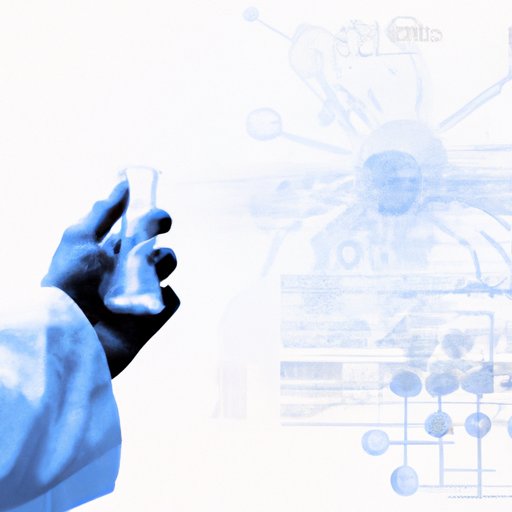Introduction
The life sciences industry is a rapidly growing field that encompasses research and development in the areas of biotechnology, pharmaceuticals, healthcare, and medical devices. It is a complex and dynamic industry that has been instrumental in driving advances in medicine, health care, and public health. This article seeks to explore the value and impact of the life sciences industry, as well as the various career opportunities, challenges, and future prospects within this sector.
Overview of the Life Sciences Industry
The life sciences industry is a broad term that encompasses a range of sciences related to the study of living organisms, including biology, genetics, biochemistry, and molecular biology. This industry is responsible for the development of new medicines, treatments, and technologies that improve human health and wellbeing. It also includes the production of food products, cosmetics, and other consumer goods.
Within the life sciences industry, there are a variety of different career paths available. These include biomedical engineers, geneticists, pharmacologists, biostatisticians, and more. Each of these roles requires specialized knowledge and skills, and each one can have a significant impact on the advancement of human health and wellbeing.
In recent years, the life sciences industry has seen a number of trends that are impacting the sector. For instance, there has been an increased focus on personalized medicine, which involves tailoring treatments to individual patients based on their genetic makeup. Additionally, the industry has seen a shift towards open source software, which allows scientists to collaborate more easily and share data more quickly.

The Value of the Life Sciences Industry
The life sciences industry has great potential to benefit both individuals and society as a whole. On an individual level, advances in the industry can lead to improved health outcomes, such as longer life expectancy and fewer hospital visits. On a societal level, the industry can help to reduce the burden of disease, drive economic growth, and foster innovation.
According to a report from the National Institutes of Health (NIH), the life sciences industry had a total economic impact of $1.6 trillion in 2018. This figure includes direct spending on research and development, indirect spending on related industries, and induced spending on wages, taxes, and other economic activities. Additionally, the NIH estimates that the industry supports nearly 10 million jobs in the United States alone.

Careers in the Life Sciences Industry
There are a wide variety of career opportunities in the life sciences industry, ranging from research and development to product development and marketing. Those interested in pursuing a career in the life sciences should consider the type of job they are interested in and the skills and qualifications required for that role. For example, those interested in research and development may need to have a degree in a relevant field, such as biology or chemistry.
When it comes to salaries and benefits, the life sciences industry is competitive. According to the Bureau of Labor Statistics, the median salary for a biomedical engineer is $88,550, while the median salary for a geneticist is $82,840. Additionally, many employers offer additional benefits, such as health insurance, retirement plans, and flexible hours.
Challenges Facing the Life Sciences Industry
Despite the potential of the life sciences industry, there are a number of challenges that must be overcome in order for it to reach its full potential. One of the main challenges facing the industry is regulatory hurdles. In order for a new technology or product to be approved for use, it must go through a rigorous approval process. This can be a lengthy and expensive process, which can slow down the development of new treatments and technologies.
Additionally, the industry faces technological challenges. Advances in technology have made it easier for researchers to collect and analyze data, but the sheer amount of data can be overwhelming. Additionally, some technologies, such as artificial intelligence, can be difficult to implement in a regulated environment.
Finally, the industry faces financial challenges. Funding for research and development can be difficult to obtain, and venture capital funding can be hard to come by. Additionally, the cost of developing and launching new products can be prohibitively expensive.
The Impact of the Life Sciences Industry on Society
The life sciences industry has had a profound impact on society. On the positive side, advances in the industry have led to improved treatments for diseases, better access to healthcare, increased life expectancy, and improved quality of life. Additionally, the industry has spurred economic growth and created new jobs.
On the negative side, the industry has been criticized for its lack of diversity, particularly in leadership positions. Additionally, some have argued that the industry has placed too much emphasis on profit over people, leading to high prices for medications and treatments.

The Future of the Life Sciences Industry
The future of the life sciences industry is bright. With advances in technology and data science, researchers are now able to develop treatments and technologies at a faster pace than ever before. Additionally, the industry is becoming increasingly global, with collaborations between countries and organizations leading to greater innovation.
However, there are still challenges that must be addressed in order for the industry to reach its full potential. Regulations must be updated to keep pace with technological advancements, and more funding must be made available for research and development. Additionally, efforts must be made to increase diversity within the industry.
Conclusion
The life sciences industry is an incredibly important and dynamic sector that has the potential to benefit society in a number of ways. From providing new treatments and technologies to creating jobs and stimulating economic growth, the industry has already had a significant impact. However, there are still challenges that must be addressed in order for the industry to reach its full potential. With the right investments and policy changes, the life sciences industry can continue to make a positive contribution to society.
(Note: Is this article not meeting your expectations? Do you have knowledge or insights to share? Unlock new opportunities and expand your reach by joining our authors team. Click Registration to join us and share your expertise with our readers.)
